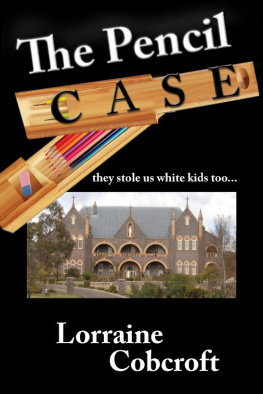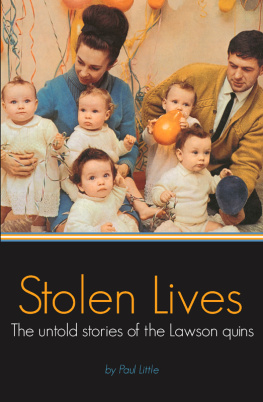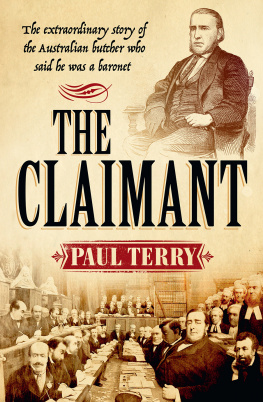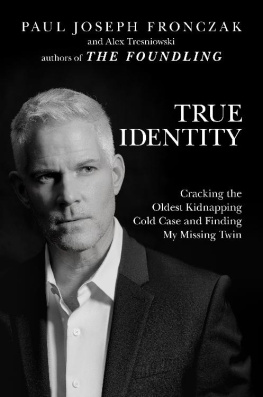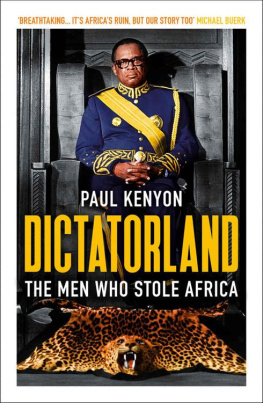The Pencil Case
by LorraineCobcroft
Copyright, LorraineCobcroft
Brisbane Australia,2013
All rights reserved
ISBN9780980571417
Smashwords Edition.Published by Rainbow Works Pty Ltd. Print copies available
This ebook islicensed for your personal enjoyment only. The ebook may not bere-sold or given away to other people. If you would like to sharethis book with another person, please purchase an additional copyfor each recipient.
If yourereading this book and did not purchase it, or it was not purchasedfor your use only, then please return to Smashwords.com andpurchase your own copy.
Thank you forrespecting the author's rights.
What readers aresaying about ''The Pencil Case''
a confrontingaccount of a disgraceful time in Australias history.
From the 1900suntil around the mid-1970s, government policy across the nation wasto remove children who they considered to be at risk in theirhome environment. This welfare legislation was enacted by peoplewho were untrained and institutionalised themselves, people whowere unable or unwilling to distinguish between genuine abuse oracknowledge that lack of money did not mean a bad home life
A great dealhas been written about the indigenous children who were taken fromtheir homes and fostered sometimes adopted by white Australianfamilies, but white children who were similarly torn from theirparents were not and are still not adequately acknowledged by theAustralian government.
THE PENCIL CASEis a deeply emotive story of one familys tragedy,
Mrs Cobcrofthas crafted a story which illustrates the beauty of the humanspirit, the ability of a strong person to rise above thecircumstances which, through no fault of his own, dogged PaulWilsons life.
There isnowhere to hide, emotionally, physically or historically forperpetrators or victims in this memoir.
A must read forthose who care.
Diana Hockley
a verypowerful storya story that should be heard.
M.A. McRae
CONTENTS
ENDNOTES
OTHER WORKS BY THEAUTHOR
PART I
1: COURTROOMBULLSHIT
OCTOBER, 1956
Bullshit!
FrederickWilson thrust a handful of torn paper towards the bench and stormedfrom the courtroom. Outside, he spat in the gutter, wiped sweat andtears from his face, slung a worn coat over his shoulder andstumbled down the street.
Slumpedshoulders reduced his height to a neat six feet. His tie hungloosely now, its knot slightly askew. A narrow belt drew shiny,oversized trousers in to fit a scant waist, but the creases weresharp. Despite its fraying collar, his shirt was crisply starchedand snow white.
At the corner,he hesitated and glanced back uncertainly. Suited men emerged fromthe courthouse. His children must be still inside. He rememberedhow they looked as he passed them, leaving: little Jenny, tearful,trembling, gripped that grubby doll like a lifeline; Paul,whitefaced, lips set tight, stood tall and glared defiantly at thejudge.
A chip off the ol block, he thought with a surge of pride.Hell survive. Hell take care of his sister too, if they lethim.
Anotherterrifying thought ripped through his being. He faltered and almostfell.
God, dont let them separate them, hemumbled.
Rightinghimself, he stared for a brief moment at the group congregatingoutside the courthouse.
Bastards! he screamed. Curse you lousybastards! He turned the corner and was gone.
JUNE,2010
Its been over50 years now, Paul said, his tone more reflective than wistful,but I remember me well. I was a bright, confident, happygoluckykid --- like my dad, Fred, if war and bullshit hadnt beaten somuch of him out of him. Like my brothers. Sure, theyre bushies ---a bit rough around the edges. But theyre decent, hardworking, andsmart in their own ways. Their skins fit comfortably, and they wearshellberightmate grins and answer You bet to every Can you?question. That was me, too, until I was eight. Ern shot PaulWilson a sympathetic smile as they bounced through the entrance tothe desolate property. Paul parked by the scant remnants of the oldshack, and they climbed out of the sleek RollsRoyce Ghost, nowthickly coated with powderypink dust and showing faint red sweatstains on its plush doveleather seats.
This case waschallenging Erns allegiance to professional principles. Of coursehe was aware of the tragedy of the Stolen Generation, and some ofthe victims stories had moved him. But interviewing the players inPaul Wilsons saga had affected him on an emotional level, and hestruggled to maintain an acceptable level of detachment.Confronted, now, with a mental image of a black car transportingterrified children away from the familiarity of this bushland homeand into a foreign universe, his intellect acknowledged the logicand valid intention of ,but his emotions resisted. He took several deep breaths and orderedhis stomach to be still, but it was miserably upset.
He sniffed theair and listened to the sounds of the bush, snapped a millionimages of nothing and scribbled copious notes. He felt and smeltthe dust, the blades of grey grass and the eucalyptus leaves. Paulhad told him how his dad predicted rain by observing the changingcolour of tree bark, and now he peeled away the paperywhite barkon the tree trunks to examine the red and yellow hues beneath.
He wasthorough, but Paul had come to expect that of Ernest Stanley. Hewas the consummate legal professional. Hed become, over the pastfew months, a trusted mate. By now, Ern knew much of Pauls story,but he wanted to fill in the gaps in intricate detail. He wanted tounderstand the world Paul came from, and what drove him. He wantedto get to know the man Paul Wilson was, and the man he might havebeen.
The colours ofthe land had begun to soften and the shadows of the sparse scrubbytrees lengthened as they started for the town, wheels crushingspiky, low, bluegrey grass flat against the hard, red earth. Thesuns hot fingers painted streaks of burnt orange and brilliantredgold over the distant horizon.
Paul pulledinto the parking lot of the quaint little country motel, climbedout of the Rolls and thrust the keys in his pocket. Ern gatheredhis papers.
Paul phoned hiswife, and Ern warmed in admiration as he listened to the onesidedconversation. In the area of relationships, at least, Paul hadbeaten the odds. He was resilient too. Ern had probed beneath hisarmour, seen the wounds and scars and the furious yearning forjustice. But Paul presented, publicly, as a man content with hislot in life. He was equipped with a delicious sense of humour and afirm conviction that, one way or another, things would alwayseventually turn out all right. He was a survivor, not a victim, andthat presented Ern with a challenge he embraced with vim.
They madeselections from the minibar, switched the television on, and sankinto the sighing depths of a worn cottoncovered sofa. In themorning, the reliving of Paul Wilsons saga would begin.
~~~~
2: A BUSHHOME
1948TO 1956
I guess thebullshit really started when I was about five. I was born in 48,so it would have been 1953. We were living in a bush town inwestern New South Wales. A toff came to visit us, demandingmoney.
The man wore acrisp white shirt and a dark tie and was cleanshaven, with oiledhair slicked back from a pale forehead. He held a zippered leatherfolio with gold embossing on the front in his soft white hands. Heshouted at Mum until she cried.
My dad wasthin, but muscled from hard work and his hands were big and rough.The man looked no match for him, so it shocked me to see my big,strong father tremble in his presence. Dad swore at the man, butthe colour left his face, and afterwards he sat at our kitchentable with his head in his hands. Mum said for once she wished hehad money to go to the pub and drown his sorrows.

